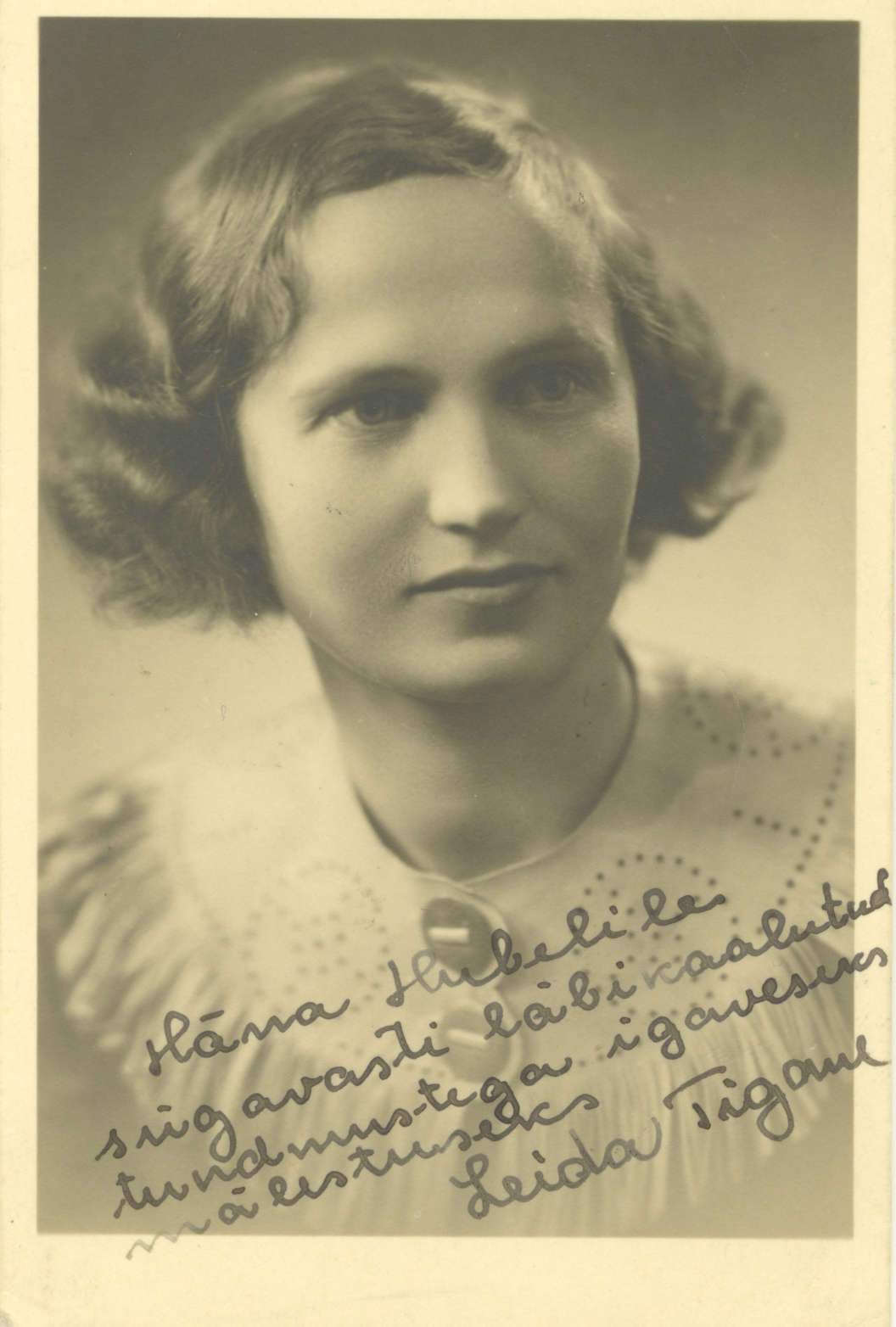
Leida Tigane
Leida Tigane (21./8. V 1908 – 13. II 1983) was a prose writer and children’s author.
She was born and educated in Tartu, and graduated from the Girls’ Gymnasium of the Estonian Youth Education Society (1927). She worked as a compositor, editor of the children’s magazine Päike, for the scientific publisher Teaduslik Kirjandus, the newspaper Postimees and the cultural paper Sirp ja Vasar. She was a member of the Writers’ Union (from 1945) and the CPSU (from 1949). She died in Tallinn, and was buried at the Metsakalmistu (‘Forest Cemetery’) of Tallinn. Her sister was the children’s author Aino Tigane (1912 – 1991).
She came to literature with some children’s stories published in periodicals in 1927; Lugu kahest laisast varesest (‘The Story of the Two Lazy Crows’, 1936) and Metsatalu vahvad loomad (‘The Great Animals of Forest Farm’, 1938) appeared separately in book form. However, what is predominant in her works of the thirties are her novels of entertainment for adults: the first of them was Palun seda härrat (‘That Gentleman, Please’, 1935), which was followed by the novels Marga müüb mehi (‘Marga Sells Men’, 1937), Seitse pastlapaari (‘Seven Pairs of Moccasins’, 1938) and Sõber meriröövel (‘Friend Pirate’, 1939). The protagonist in the novels is usually a young lady who wishes to marry, and the realisation of this aim occasions various comical circumstances. Humour and comedy are among Tigane’s characteristic traits. She gives lively descriptions of the slum environment and describes colourful types and domestic conditions. These last are artfully displayed in the events in Tigane’s nicely balanced Seitse pastlapaari, in which the views of a young urban high-school girl and the more conservatively inclined residents of a farmhouse come into collision.
After the Second World War Tigane concentrated on children’s literature, publishing, for example, Vanaema maja (‘Grandma’s House’, 1946), Kelleks ma tahan saada (‘Who I Want to Be’, 1948), Mina oskan paremini (‘I Can do it Better’, 1952), Jutte lastele (‘Stories for Children’, 1955). Great popularity came with Peremees ja sulane (‘The Master and the Farmhand’, 1958), based on motifs from Estonian folklore. A survey of her work is available in the selections Tera siit ja teine sealt (‘One Grain from Here and Another from There’, 1968) and Vikerkaar (‘Rainbow’, 1978). There are animal stories as well as stories of contemporary life for children in her work. Characteristic of Tigane is gripping subject-matter and a humorous and optimistic world-view, in which there is a place for instruction too.
In 1932 Tigane won third prize in the Vaba Maa literature competition for her humorous piece Jänesejaht (‘Hunting Hares’), second prize in the Loodus publishing house’s novel competition for the novel Seitse pastlapaari (1938) and second prize for the novel Sõber mereröövel (1939) in the newspaper Päevaleht competition for serial novels. The story Hunt ja kutsikas (‘The Wolf and the Puppy’) won second prize in the 1940 competition for children’s books.
A. K. (Translated by C. M.)
Books in Estonian
Novels
Palun seda härrat…. Tartu: Noor-Eesti, 1935, 163 lk. [2. trükk: 2015.]
Marga müüb mehi. Tallinn: Kuldkiri, 1937, 152 lk.
Seitse pastlapaari. Tallinn, Tartu: Loodus, 1938, 320 lk. [2. trükk: 1974.]
Sõber meriröövel. Tallinn: Tallinna Eesti Kirjastus-Ühisus, 1939, 160 lk. [2. trükk: 2012.]
Children’s literature
Lugu lahest laisast varesest. Tartu: Loodus, 1936, 48 lk. [Järgmised trükid: 1959, 2003.]
Metsatalu vahvad loomad. Tartu, Tallinn: Loodus, 1938, 40 lk. [2. trükk: 1946.]
Hunt ja kutsikas. Tallinn: Eesti Kirjastus, 1943, 31 lk. [2. trükk: 1948.]
Vanaema maja. Tallinn: Ilukirjandus ja Kunst, 1946, 44 lk. [2. trükk: 1980.]
Kelleks ma tahan saada. Tallinn: Ilukirjandus ja Kunst, 1948, 36 lk.
Mina oskan paremini. Tallinn: Eesti Riiklik Kirjastus, 1952, 39 lk.
Jutte lastele. Tallinn: Eesti Riiklik Kirjastus, 1955, 32 lk.
Peremees ja sulane: jutte rahvajuttude aineil. Tallinn: Eesti Riiklik Kirjastus, 1958, 24 lk. [Järgmised trükid: 1960, 1989, 2011.]
Tera siit ja teine sealt. Tallinn: Eesti Raamat, 1968, 168 lk.
Vares keedab hernesuppi. Tallinn: TEA Kirjastus, 2009, 37 lk.
Orav Pikkhamba söökla. Tallinn: TEA Kirjastus, 2010, 31 lk.



